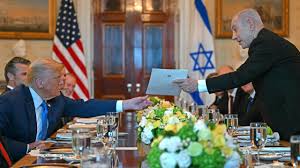Netanyahu nominates Trump for Nobel Peace Prize after meeting at White House, Gaza ceasefire discussed

In a diplomatic moment that surprised even seasoned political observers, Israeli Prime Minister Benjamin Netanyahu formally nominated former U.S. President Donald Trump for the 2025 Nobel Peace Prize during a high-profile meeting at the White House. The move came as the two leaders discussed a possible ceasefire in Gaza and wider regional stability efforts. While the Nobel nomination has ignited fierce debate across political circles, it also signals the deepening of ties between the former U.S. leader and the current Israeli administration.
A Dinner, a Nomination, and a Ceasefire Discussion
The private dinner between Netanyahu and Trump on July 7 at the White House was expected to revolve around the ongoing violence in Gaza, Israeli hostages, and the growing tensions with Iran. However, the evening took a symbolic turn when Netanyahu presented Trump with a signed nomination letter for the Nobel Peace Prize.
The nomination, according to Israeli officials, was based on Trump’s role in brokering the Abraham Accords in 2020—historic agreements that normalized relations between Israel and several Arab nations, including the United Arab Emirates and Bahrain. Netanyahu described the accords as a “breakthrough in Middle Eastern diplomacy,” asserting that Trump’s leadership played a pivotal role in fostering peace.
Trump’s Reaction and Political Implications
A visibly moved Trump responded with gratitude, stating, “This means a lot coming from Prime Minister Netanyahu. We’ve done great things together.” He reiterated his belief that the Abraham Accords set the stage for broader Middle East stability and expressed confidence that a lasting Gaza ceasefire could be within reach.
Political analysts, however, have raised questions about the timing and motive behind the nomination. Some view it as a political gesture aimed at boosting Trump’s international credentials ahead of the 2026 midterms and possibly the 2028 presidential race. Others see it as a genuine recognition of diplomatic efforts that, though controversial, reshaped the geopolitical landscape.
The Nobel Peace Prize Process and Trump’s Candidacy
While Netanyahu’s nomination of Trump carries symbolic weight, the actual selection process for the Nobel Peace Prize remains rigorous and opaque. The Norwegian Nobel Committee receives hundreds of nominations annually—submitted by world leaders, academics, and peace organizations. While nominations for the 2025 prize officially closed in February, late endorsements from high-profile leaders can still influence future considerations.
Notably, Trump has been nominated in the past, including by Norwegian and Swedish parliamentarians. However, he has never advanced to the final shortlist, let alone won. Netanyahu’s formal endorsement may revive interest in his candidacy, but many experts argue that peace must be sustained—not just initiated—to warrant such recognition.
Ceasefire in Gaza: The Bigger Picture
Beyond the headlines of the Nobel nomination, the Netanyahu–Trump meeting also centered on urgent and complex security issues, particularly the deteriorating humanitarian situation in Gaza. Reports suggest that discussions included the framework for a proposed 60-day ceasefire, brokered in coordination with Egypt and Qatar.
The ceasefire plan would involve the release of Israeli hostages held by Hamas, a temporary withdrawal of Israeli forces from key areas, and the opening of humanitarian corridors. In exchange, Hamas would halt rocket attacks and agree to international oversight. Both leaders expressed cautious optimism, though Trump stressed the need for “iron-clad enforcement mechanisms.”
The situation remains delicate. With hundreds of civilians killed in recent months and infrastructure in Gaza on the brink of collapse, humanitarian agencies have warned that time is running out. A credible ceasefire would require not only agreement from political factions but also backing from influential players like the U.S., Iran, and the Gulf states.
Netanyahu’s Washington Visit: More Than Symbolism
Netanyahu’s latest visit marks his third trip to Washington in less than a year. Observers note that his engagement with Trump, rather than current President Joe Biden, reflects a shifting political alignment. With Trump’s influence in Republican and international circles growing, Netanyahu appears to be strengthening ties that could benefit Israel regardless of America’s next electoral outcome.
The Israeli leader also met with Republican members of Congress and key figures in the Trump campaign, signaling that diplomacy is now deeply intertwined with election-year politics. Critics have accused both Trump and Netanyahu of using international issues to deflect from domestic controversies—Trump’s ongoing legal troubles and Netanyahu’s challenges within Israel’s coalition government.
Criticism and Praise: A Polarizing Gesture
Reactions to Netanyahu’s Nobel nomination for Trump have been sharply divided. Supporters argue that the former president’s role in the Abraham Accords, U.S.–Taliban peace talks, and North Korea summits deserves formal recognition. Detractors counter that these efforts have either unraveled or failed to deliver lasting peace.
Human rights organizations, including Amnesty International, criticized the move as “political theater,” pointing to Trump’s controversial decisions on Jerusalem, the Iran nuclear deal, and reduced funding for Palestinian aid. Palestinian leaders labeled the nomination a “slap in the face” and dismissed the Abraham Accords as a “one-sided normalization.”
Conclusion: A Symbolic Nomination in a Turbulent Time
Whether Donald Trump will ever receive the Nobel Peace Prize remains uncertain. What is clear, however, is that Benjamin Netanyahu’s nomination has reignited global discussion around Trump’s foreign policy legacy. At the same time, the gesture sheds light on the urgent need for a real and lasting ceasefire in Gaza—a crisis far more pressing than awards and accolades.
In a region where peace remains fragile and diplomacy ever volatile, symbolic gestures like this one carry both promise and peril. As ceasefire negotiations proceed, the world watches not just for prizes—but for progress.






